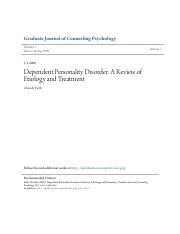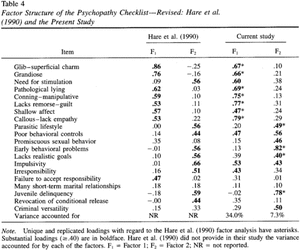

Items are scored on the basis of an interview and a review of case history information in some circumstances, it may be possible to base ratings solely on case history information. Parts 1 and 2 are parallel to Factors 1 and 2 of the PCL-R. Part 2 comprises 6 items that reflect an impulsive and irresponsible behavioral style and a history of criminal conduct in adolescence and adulthood. Part 1 comprises 6 items that reflect an arrogant and deceitful interpersonal style and deficient affective experience.

Finally, item definitions were shortened from an average of about 200 words in the PCL-R to about 50 words in the PCL:SV.Įach PCL:SV item reflects a specific symptom (i.e., clinical feature) of psychopathy. Third, PCL-R items reflecting antisocial behavior were redefined in the PCL:SV so that they could be scored without reference to an official criminal record (i.e., formal charges or convictions). Second, PCL-R items defined in terms of specific socially deviant behavior were excluded from the PCL:SV. First, scale length was reduced from 20 items in the PCL-R to 12 items in the PCL:SV by combining PCL-R items with overlapping content. The PCL:SV was developed to address several recognized limitations of the PCL-R.

Originally written in English, the test has been translated into Swedish and German. Its development culminated in the publication of the test manual by Multi-Health Systems Inc. MacArthur Foundation’s Research Network on Mental Health and the Law, under the direction of John Monahan, School of Law, University of Virginia. Because of its demonstrated association with future violence, the PCL:SV is most often used as part of a comprehensive violence risk assessment, using structured professional guidelines for assessing violence risk such as the HCR-20, the Sexual Violence Risk-20 (SVR-20), and the Spousal Assault Risk Assessment Guide (SARA).ĭevelopment of the PCL:SV took place between 19, funded in part by the John D.

As its name implies, the PCL:SV also can be used in conjunction with the PCL-R as a screening test in correctional and forensic psychiatric settings, with elevated scores on the PCL:SV triggering administration of a more detailed and comprehensive assessment using the PCL-R. The PCL:SV is intended for use with adult males and females in a broad range of settings, including correctional, forensic psychiatric, civil psychiatric, and community settings. It was derived from the Hare Psychopathy Checklist-Revised, or PCL-R. The Hare Psychopathy Checklist: Screening Version (PCL:SV) is a 12-item symptom-construct rating scale designed for use by expert observers to assess the lifetime presence and severity of symptoms of psychopathic personality disorder.


 0 kommentar(er)
0 kommentar(er)
